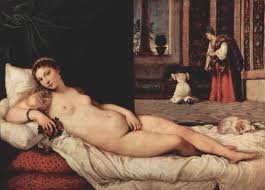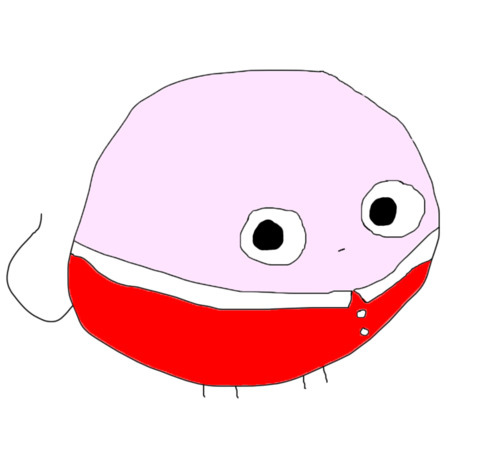The Naked Eye: Toward an Object-Oriented Ontology in the Literature of Tao Lin
On being seen naked in the bathroom by his pet cat, Derrida likens the feline’s stare to “… the gaze of a seer, visionary, or extra-lucid blind person,” (372). I am compelled to thwart such clairvoyance by putting my laptop to “sleep” before lying down myself, often as surprised at my self-consciousness before this medium as Derrida before his cat. Derrida intends this cat as his own rather than allegory, and professes the singularity of its response in juxtaposition to their shared situation (377). His cat gazes at him. Human self-consciousness and capacity for shame empower nonhuman entities. If matters of endowment may predicate cognizance, then the human fabrication underlying new media should not exclude them from our collective bathroom audience.
Olympia, however, does not blush before the cat perched comically on the end of her chaise lounge. Discomfort emanates, rather, from the viewer, aware not only of Manet’s archetypical gaze of the male artist, but also that of his female subject. In his seminal essay “Olympia’s Choice,” T. J. Clark describes Olympia’s peculiar gaze as “…candid but guarded, poised between address and resistance—so precisely, so deliberately, that it comes to be read as a production of the depicted person herself,” (133). To empower Olympia’s gaze, however, is to strip it of its femaleness. “It is sometimes said –it was already in 1865– that Olympia is not female at all, or only partly so,” (Clark 131-132).
Manet’s Olympia (1863) responds to Titian’s The Venus of Urbino (1538). In the leap from Venus to Olympia, the protagonist loses some feminine flesh and gains a woodenness of posture. Olympia’s countenance is reminiscent of a cadaver or a prosthesis; indeed, on the meridian between lifelessness and animus, Olympia embodies a fault that outraged her contemporaries and a fault line that shakes conceptions of the cyborg, so often gendered as if it had found Olympia’s refuted femininity in the detritus of Art History and, like a garment, tried it on.
Olympia, like Derrida’s cat, embodies an Other composed of both thingness and animus– an image that is not the passive receiver of a gaze, but whose own has been signified by the failing of human control in the male viewer at the 1865 Salon. If, as Derrida asserts, “Nudity is nothing other than that passivity, the involuntary exhibition of the self” (380), can one passively present the self before new media and digital culture? Not, for example, on the Internet, but before the Internet: not the webcam, but the screen?
The poems, short stories, and novels by contemporary writer Tao Lin answer in the affirmative. In 2009, New York magazine deemed Lin the new “lit” boy, a young writer whose use of digital media to maintain simultaneous images of eccentricity and apathy, erudition and colloquialism, empathy and detachment, humor and depreciation in his literary works and personal, public, and virtual lives have become a maxim of post-millennial, 2.0 culture (Anderson). The gaze, specifically in relation to a computer screen, constitutes a dominant force in Lin’s works. His sophomore novella, Shoplifting From American Apparel, opens with the passage, “Sam woke around 3:30 p.m. and saw no emails from Sheila. He made a smoothie. He lay on his bed and stared at his computer screen,” (1). The poem “Opposite of Song of Myself” includes the lines, “I click the mouse and I despair/ staring at the computer screen.” In Lin’s most recent novel, Richard Yates (2010), “Haley Joel Osment stared at the computer screen. He rode the N train to his apartment.”
The omnipresence of computer-staring, like Lin’s literary works themselves, is semi-autobiographical. “Now I know that it doesn’t really matter where I go. If I go to Japan I’ll still be in a room staring at the computer screen,” Lin says in a Blookslut interview. And Lin does not stare in isolation. “It is 10 PM now, and Godzilla has been sitting at his desk in front of his laptop for six to seven hours. He has accomplished hardly anything today,” writes Brandon Scott Gorrell in a short story titled “Minimizing and Maximizing Mozilla Firefox Repeatedly,” published by Lin’s electronic and print publishing initiative, Muumuu House.
In order to unpack the relationship that takes place within the shared gaze of human and nonhuman bodies such as cats, paintings, and computer screens, one must consider a certain amount of universal sentience– what Jane Bennett calls “material agency” or “thing-power” (Vibrant Matter). One must ask, as does Derrida, “Ashamed of what and naked before whom?” (373). One must ask, as does W. J. T. Mitchell, “What do pictures want?” Introductory wordplay such as “(corpo)real” and “eyes (I’s?)” foreshadow Trey Conatser’s argument that the experience of the human body retains the authority to authenticate reality (365-366). Yet Olympia’s “eyes” made her an “I.” As Mitchell writes, “The widest implication of the metapicture is that pictures might themselves be sites of theoretical discourse, not merely passive objects awaiting explanation by some non-pictorial (or iconoclastic) master-discourse.” Bennett currently researches hoarders as humans with the ability to relinquish their master-discourse, or, as Bennett qualifies, “people who seem to be preternaturally attuned to things” (Powers of the Hoard) in the way that Tao Lin seems attuned to digital text. Lin has embarked on a task that Bennett describes as her need “to fiddle around with language in the hopes of tuning my senses toward the frequencies of the thing-powers inside and around me” (Powers of the Hoard). Developing a language where language is lacking has always been the charge of the writer. Whereas Bennett speaks of “utility screens of perception” that block access to thing-power (Powers of the Hoard), I suggest that Lin’s discourse is one with the computer screen as a permeable entity.
Tao Lin’s object-oriented ontological approach to new media literature and its surrounding culture understands Bennett’s command: “Don’t think, just do, and by doing, you accept that you yourself are a piece of vibrant matter,” (Vibrant Matter 14). Lin seems aware of his own thing-power in an article written by himself about himself for Seattle’s The Stranger:
He prefers to view himself not as a “novelist” or a “serious novelist” or a “great American novelist” but as a “human”—or, in his stricter moments, “organism” or “thing.” He’s a physically tenebrous guy, 5 ft., 7 in., with straight posture and a slightly zombielike expression one imagines to be the result of an imperceptibly rapid deviation, like a wave-particle model, between “almost crying” and “almost asleep.”
Conatser seems accurate in his identification of a “… dualism of mind and body that is enjoying a strong patronage, whether resisted, unintended or embraced, in new media studies. Such dualism, as it is (re)produced by new media discourse, indicates a theological undertone in which the body is a prison and the mind (or spirit) is intrinsically ‘free’ and would be so if it were not trapped within the body,” (368). Conatser distinguishes between corporeal and affected action (369): his aforementioned“(corpo)real” verses, for example, action resulting from Lin leaving his personal cell phone number on blog comment threads pertaining to himself as a literary figure, as he is known to do. For Conatser, a gap exists between the human body and Otherness. It is this gap, perhaps, that disturbed viewers of Manet’s corpse-like Olympia. It is this gap that Opera-tan, the moe anthropomorphism of the Opera browser, works to reduce.
It is this gap that Jillian Weise references in her book of poems, The Amputee’s Guide to Sex (59):
The nape of my neck is a tell.
Otherwise you wouldn’t notice
with the layers of clothes: shirt,
vest, scarf, coat.Undressed, it’s a solitary hole
in the middle of a white wall, you
can’t help but stare, what picture
hung there, what of, what color?
Tao Lin, however, writes from a position of corporeal passivity within digital culture, and no such questions characterize his work. Lin is neither Olympia’s necro-prototype to a cyborg, nor is he the metaphor of tedious hybridity that may be interpreted in Weise’s gaze toward a posthumanist horizon. Digital technologies such as G-chat do not serve as the prosthetics of (corpo)real social interactions in Lin’s writing, and his resulting books are not their inert attachments. Intentionality does not enter a discussion of Tao Lin’s new media with the same urgency that a stylistic reading of Joni Mitchell would call attention to her attributive lyrics, “You turn me on; I’m a radio.” Lin’s gaze exists within the context of the culture he helps to create with literary works and intra-diegetic, “in-game” extensions such as his techniques for funding and self-promotion. Lin has falsified advertisements for interns, sold shares of a novel- in-progress, used pen/maker, Microsoft Paint, and Photoshop to render a viral amount of simple drawings for Ebay auction, and developed email campaigns with the doggedness of spam.
To illustrate its lamentation of Lin’s electronic fercundity, New York City-based media news and gossip site Gawker published the following email:
Hello,
I am a hot young (b. 1983) writer who went to NYU. My forthcoming books have ironic covers. Miranda July is inside the novel. I’m ambitions, sexy, and intelligent. My IQ is 173. I recognize both existential truths and the necessity of politics for a meaningful existence.
Though all meaning is arbitrary it can still be used as a tool just like arbitrary rules can be created to make life “better.” I hope you understand.
I hope you recognize that I’m hot, young, that I went to NYU, and have ironic book-covers. I think you know what all this means.
Sincerely,
Tao Lin
The deadpan syntax, repetitive vocabulary, and minimalistic discourse of this email are indicative of Lin’s works. Direct descriptions of his characters’ thoughts and feelings are sparse; often “no reaction” or “neutral facial expression” constitute a viable response. Lin is more apt to invest in hamsters, organic smoothies, and other nonhumans reoccurring in his milieu. Taken within Lin’s overarching persona, close readings of his work contribute to his contextualization of himself within a new media machine, endowed with only as much or as little judgment as human sentience or spam filters are capable.
Public readings of the poem “I Went Fishing with My Family when I Was Five” often end with Lin repeating the poem’s last line, “the next night we ate whale,” for the duration of several minutes (3:44 in the video below), toeing the brink of discomfort, placing one foot in glitch territory, and balancing on his capacity to hack his own poetry:
Through the cultivation of language, aesthetics, and practice, Lin echos Bennett’s query, “What if things really can, in some undetermined sense, hail us and open a window onto a complex, throbbing, alternative universe uninhabited by either subjects or objects?” (Powers of the Hoard). The universe Bennett describes may well be virtual, and eventually actualized by the trajectory of contemporary efforts such as Lin’s Muumuu House, the submission policy for which reads:
Muumuu House does not accept submissions for acceptance/rejection. All work published on the site was first read on people’s blogs or in emails or on Twitter or other websites for purposes of personal enjoyment or simply as work being shared among friends or strangers. Those interested in Muumuu House are encouraged to communicate with people involved with Muumuu House (commenting on blogs or messaging people or being involved in some other manner) for purposes of friendship or relieving boredom or having fun. Muumuu House strives to avoid engaging in business-like relationships.
Bennett’s vision and Lin’s utility lean new media literature toward an ontological approach to itself: a new media literature that is, simply, literature. As Derrida writes, “The animal, therefore, is not naked because it is naked. It doesn’t feel its own nudity. There is no nudity ‘in nature.’ There is only the sentiment, the affect, the (conscious or unconscious) experience of existing in nakedness,” (374). Tao Lin writes within the framework that, as a digital culture, we are all already naked.
Just pretend the audience is naked: Amsterdam-based, indy-folk band Spilt Milk perform “Neutral Facial Expression,” with lyrics composed from the first page of Richard Yeats by Tao Lin.
Works Cited
Anderson, Sam. “New Lit Boy: Tao Lin.” New York. New York, 11 Jan. 2009. Web. 09 Sept. 2011.
Bennett, Jane. “The Force of Things: Steps toward an Ecology of Matter.” Political Theory. 32.3 (2004) : 347-372. JSTOR. Web. 9 Sept. 2011.
—. “Powers of the Hoard: Notes on Material Agency.” ICI Berlin. ICI Berlin, Berlin. 24 May 2011. Keynote Address. Web. 09 Sept. 2011.
—. Vibrant Matter: A Political Ecology of Things. Durham, NC: Duke University Press, 2009. Google books. Web. 09 Sept. 2011.
Conatser, Trey. “There’s no “I” in Information: some naysayings for new media studies.” New Media & Society 12.3 (2010) : 365-378. SAGE. Web 10 Sept. 2011.
Clark, T. J. The Painting of Modern Life: Paris in the Art of Manet and His Followers. Princeton, NJ: Princeton University Press, 1984. Print.
Derrida, Jacques. “The Animal That Therefore I Am (More to Follow).” Trans. David Wills. Critical Inquiry 28.2 (2002) : 369-418. JSTOR. Web. 09 Sept. 2011.
Gorrell, Brandon Scott. “Minimizing and Maximizing Mozilla Firefox Repeatedly.” Muumuuu House. Muumuu House n.d. Web. 09 Sept. 2011.
Gould, Emily. “Now We Also Hate Miranda July.” Gawker. Gawker, 27 June 2007. Web. 10 Sept. 2011.
Lezard, Nicholas. “Richard Yates by Tao Lin— review: Nicholas Lezard discovers the affecting quality of affectlessness.” Guardian, 13 Nov. 2010. Web. 09 Sept. 2011.
Lin, Tao. “Great American Novelist: He’s not the richest or most famous. His characters don’t solve mysteries, have magical powers, or live in the future. But in his new novel, Richard Yates, Tao Lin shows us the way we live now.” The Stranger. The Stranger, 21 Sept. 2010. Web. 09 Sept. 2011.
—. “An Interview with Tao Lin.” Interview by Ned Vizzini. Bookslut. Bookslut, 2007. Web. 08 Sept. 2011.
—. “Opposite of Song of Myself.” TAO LIN BLOG, 21 Nov. 2007. Tao Lin. Web. 08 Sept. 2011.
—. pink hamster. 2011. TAO LIN TUMBLER PRESENCE. Tao Lin, 30 March 2011. Web. 12 Sept. 2011.
—. Richard Yates. Brooklyn, NY: Melville House, 2010. Print.
—. Shoplifting from American Apparel. Brooklyn, NY: Melville House, 2009. Print.
Mitchell, W. J. T. “What do pictures want?” Interview by Asbjørn Grønstad and Øyvind Vågnes. Image & Narrative. Center for Visual Studies, 2006. n.p. Web. 09 Sept. 2011.
Muumuu House. Muumuu House. n.d. Web. 10 Sept. 2011.
Weise, Jillian. “Incision.” The Amputee’s Guide to Sex. Brooklyn, NY: Soft Skull Press, 2007. 59. Print.



